No CrossRef data available.
Article contents
Edmund Spenser's Mona-Shul
Published online by Cambridge University Press: 02 December 2020
Abstract

- Type
- Comment and Criticism
- Information
- Copyright
- Copyright © Modern Language Association of America, 1941
References
Note 1 in page 578 Ancient Irish Histories (Dublin, 1809), i, 88, 126.
Note 2 in page 578 The Works of Edmund Spenser (London, 1805), viii, 369, 399.
Note 3 in page 578 The Works of Edmund Spenser (London, 1873), v, 360, 389. Collier seems to have reprinted Todd's text.
Note 4 in page 578 The Complete Works in Verse and Prose of Edmund Spenser (London, 1882–84), ix, 87, 122.
Note 5 in page 578 A View of the Present State of Ireland (London, 1934), pp. 69, 99.
Note 6 in page 578 According to Renwick, op. cit. p. 307, Gosart used MS. Lambeth 510, one of the two “hurried copies” made of MS. Rawlinson B. 478 upon which Renwick's edition is principally based.
Note 7 in page 578 The Works of Edmund Spenser (London, 1902), pp. 631, 642.
Note 8 in page 578 Namely in Additional MS. 22022 of the British Museum; cf. Renwick, op. cit. p. 308
Note 9 in page 578 Op. cit., p. 308.
Note 10 in page 578 The nominative singular is siubhal.
Note 11 in page 578 This t is often prefixed to a word beginning with an s if the foregoing word ends in an n.
Note 12 in page 578 In The Stanford Dictionary, ed. C. A. M. Fennell, p. 145, the second element of beantoolhe is incorrectly derived from toil, “desire,” so that beantoolhe is said to mean “a woman of pleasure.”


